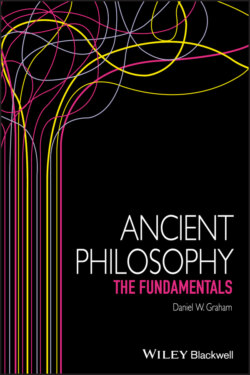Ancient Philosophy

Реклама. ООО «ЛитРес», ИНН: 7719571260.
Оглавление
Daniel W. Graham. Ancient Philosophy
Table of Contents
Guide
Pages
Fundamentals of Philosophy
ANCIENT PHILOSOPHY. THE FUNDAMENTALS
Preface
1. Introduction
1.1 From Mythology to Philosophy
1.2 History and Philosophy
1.3 Overview
Notes
2. The Presocratics. 2.1 The Birth of the Gods
2.2 A New Way of Understanding
2.3 Theories of Matter
2.3.1 Material Monism
2.3.2 The Generating Substance Theory
2.4 Parmenides’s Criticisms of Natural Philosophy
2.5 After Parmenides
2.6 Cosmogony and Cosmology
2.7 Sophistic
2.8 Conclusion
Notes
3. Socrates
3.1 The Socratic Problem
3.2 Socratic Paradoxes
3.3 Negative Method
3.4 Intellectualism
3.5 Living Virtuously
3.6 Logic Therapy
3.7 Socrates and the State
3.8 Conclusion
Notes
4. Plato
4.1 Life and Work
4.2 The Soul and Knowledge
4.3 The Transcendent Forms
4.4 The Forms and the Soul
4.5 The Republic
4.6 The Theory of Forms and Its Problems
4.7 Cosmology, Science, and Theology
4.8 Conclusion
Notes
5 Aristotle
5.1 Life and Works
5.2 Basic Ontology
5.3 Logic, Science, Knowledge
5.4 Nature, Change, and Explanation. 5.4.1 Matter and Form
5.4.2 Potentiality and Actuality
5.4.3 The Four Causes
5.4.4 Nature
5.5 Cosmology
5.6 Psychology
5.7 Metaphysics
5.8 Ethics
5.8.1 The Good Life
5.8.2 Virtue and Character
5.8.3 Responsibility and Duty
5.8.4 The Good Life Again
5.9 Conclusion
Notes
6. Hellenistic Philosophy
6.1 Epicureanism. 6.1.1 Epicurus: Life and Works
6.1.2 Natural Philosophy
6.1.3 Psychology and Epistemology
6.1.4 Ethics
6.2 Stoicism. 6.2.1 The School
6.2.2 Natural Philosophy
6.2.3 Logic and Epistemology
6.2.4 Ethics
6.2.5 Assessment
6.3 Skepticism
6.3.1 The Philosophers and the Traditions
6.3.2 Skeptical Strategies
6.3.3 Problems
6.4 Conclusion
Notes
7. Plotinus and Neoplatonism
7.1 Middle Platonism
7.2 Plotinus
7.3 The Hierarchy of Being
7.4 Souls
7.5 Ethics
7.6 Greco‐Roman Theology
7.7 Influence
Notes
8. Augustine and Christian Philosophy
8.1 Jewish Intellectual Developments
8.2 Early Christian Thought
8.3 Augustine
8.3.1 Life
8.3.2 The Problem of Evil
8.3.3 Moral Failure: Stealing the Pears
8.3.4 The Human Condition: Eating the Apple
8.3.5 The City of God
Notes
References
Index
WILEY END USER LICENSE AGREEMENT
Отрывок из книги
Series Editor: A. P. Martinich, University of Texas at Austin
.....
Here then is a preview of the stages of development of ancient Greek and Roman philosophy as we will discuss it, with some of the important ideas that arise.
First of all the Greeks, like peoples of all cultures at the same time, had traditional tales about the origins of the universe and the gods who peopled it, along with the rise of the human race (Chapter 2). In the sixth century BC, in the city of Miletus on the Aegean coast of Anatolia (modern Turkey), some thinkers proposed a naturalistic account of the origins of things. While this account assumed some of the features of the world accepted by tradition (the Earth was understood to be a flat disk surrounded by water, for instance), it explained the world as the product of natural processes rather than divine births and supernatural interventions. These thinkers did not, so far as we know, have any special name for what they were doing, but in time it came to be known as philosophy, and the early thinkers were designated (in modern times) as Presocratic philosophers (philosophers before Socrates), who marked a turning‐point in thought. In the earliest models of speculation, the world was thought to be composed of basic or elemental stuffs that turned into each other. In one version, fire was the rarest kind of matter, that, when it was condensed, turned into air; when air was condensed, it turned into wind; when wind was condensed, it turned into cloud; when cloud was condensed, it turned into water; when water was condensed, it turned into earth; when earth was condensed it turned into stones. And this process could be reversed, so that denser materials would be transformed into lighter materials by rarefaction. The earliest philosophers tended to pick one of their stuffs as the original stuff from which all the others derived; for instance, Thales chose water, Anaximenes air. This picture of reality allowed philosophers to propose cosmological theories, in which the world as we know it arose out of the transformations of matter, which, when they became stabilized, constituted the present world, with its ecology. For instance, water evaporates from the sea, condenses into clouds, and rains onto the Earth. From the natural world arose plants and animals, and eventually human beings, who developed cultures and technologies that allowed them to thrive. So the product of this thinking is a kind of scientific philosophy with a speculative chemistry, cosmology, biology, and anthropology – that in some crude way anticipate modern scientific theories.
.....